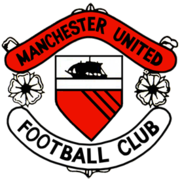Manchester United F.C.
From Wikipedia, the free encyclopedia
 | ||||
| Full name | Manchester United Football Club | |||
|---|---|---|---|---|
| Nickname(s) | The Red Devils[1] | |||
| Founded | 1878, as Newton Heath L&YR F.C. | |||
| Ground | Old Trafford (Capacity: 76,212[2]) | |||
| Owner | ||||
| Co-chairmen | ||||
| Manager | ||||
| League | Premier League | |||
| 2008–09 | Premier League, 1st | |||
| ||||
Manchester United Football Club is an English Premier League football club who play at Old Trafford in Greater Manchester. The club was formed as Newton Heath in 1878, joined the Football League in 1892 and has played in the top division of English football since 1938 with the exception of the 1974–75 season. Average attendances at the club have been higher than any other team in English football for all but six seasons since 1964–65.[3]
Manchester United are the reigning English champions and Club World Cup holders, having won the 2008–09 Premier League and the 2008 FIFA Club World Cup. The club is one of the most successful in the history of English football and has won 22 major honours since Alex Ferguson became manager in November 1986. In 1968, they became the first English club to win the European Cup, beating Benfica 4–1. They won a second European Cup as part of a Treble in 1999, and a third in 2008, before finishing runner-up in 2009. The club holds the joint record for the most English league titles with 18 and also holds the record for the most FA Cup wins with 11.[4]
Since the late 1990s, the club has been one of the richest in the world with the highest revenue of any football club,[5] and is currently ranked as the richest and most valuable club in any sport, with an estimated value of around £1.136 billion (€1.319 billion / $1.870 billion) as of April 2009.[6] Manchester United was a founding member of the now defunct G-14 group of Europe's leading football clubs,[7] and its replacement, the European Club Association.[8]
1969–1986
United struggled to replace Busby, and the team struggled under Wilf McGuinness in the 1969–70 season, finishing a disappointing eighth, and following a poor start to the 1970–71 season, McGuinness was demoted back to the position of reserve team coach. Busby was coaxed back to the club, albeit only for six months. Results got better with Busby's guidance, but he finally left the club for the last time in the summer of 1971. In the meantime, United had lost a number of high-profile players such as Nobby Stiles and Pat Crerand.
Despite approaching Celtic's European Cup-winning manager, Jock Stein, for the manager's job – Stein had agreed a verbal contract to join United, but pulled out at the last minute – Frank O'Farrell was appointed as Busby's successor. However, like McGuinness, O'Farrell only lasted less than 18 months, the only difference between the two being that O'Farrell reacted to the team's poor form by bringing in some fresh talent, most specifically Martin Buchan from Aberdeen for £125,000. Tommy Docherty became manager at the end of 1972. Docherty, or "the Doc", saved United from relegation that season but they were relegated in 1974, by which time the golden trio of Best, Law and Charlton had left the club. Denis Law had moved to Manchester City in the summer of 1973, and ended up scoring the goal that many people[who?] say relegated United, and politely refused to celebrate the goal with his team mates. Players like Lou Macari, Stewart Houston and Brian Greenhoff were brought in to replace Best, Law and Charlton, but none could live up to the stature of the three that came before.
The team won promotion at the first attempt, with a young Steve Coppell making his début towards the end of that season, having joined from Tranmere Rovers, and reached the FA Cup final in 1976, but were beaten by Southampton. They reached the final again in 1977, beating Liverpool 2–1. In spite of this success and his popularity with the supporters, Docherty was sacked soon after the final when he was found to have had an affair with the physiotherapist's wife.
Dave Sexton replaced Docherty as manager in the summer of 1977, and made the team play in a more defensive formation. This style was unpopular with supporters, who were used to the attacking football preferred by Docherty and Busby. Major signings under Sexton included Joe Jordan, Gordon McQueen, Gary Bailey and Ray Wilkins, but Sexton's defensive United failed to break out of mid-table obscurity, only once finishing in the top two, and only reached the FA Cup final once, losing to Arsenal. Because of this lack of trophies, Sexton was sacked in 1981, even though he won his last seven games in charge.
He was replaced by the flamboyant Ron Atkinson, whose extrovert attitude was reflected in the clubs he managed. He immediately broke the British record transfer fee to sign Bryan Robson from his old club, West Bromwich Albion. Robson developed into what many[who?] consider to have been United's best midfield player since Duncan Edwards. Atkinson's team featured new signings such as Jesper Olsen, Paul McGrath and Gordon Strachan playing alongside former youth team players Norman Whiteside and Mark Hughes. United won the FA Cup twice in three years, in 1983 and 1985, and were overwhelming favourites to win the league in the 1985–86 season after winning their first ten league games, opening a ten-point gap over their rivals as early as October. The team's form collapsed, however, and United finished the season in fourth place. The poor form continued into the following season, and with United on the edge of the First Division's relegation zone by the beginning of November 1986, Atkinson was sacked.


No comments:
Post a Comment